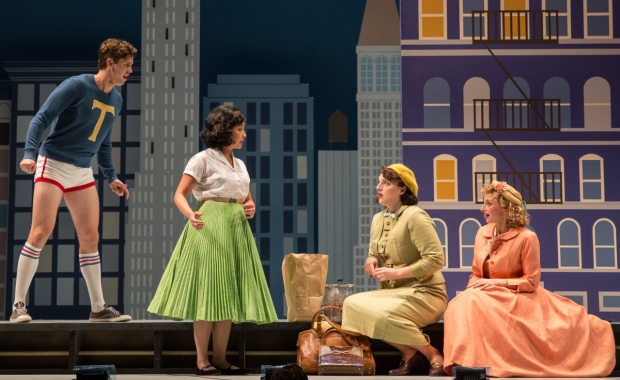Wonderful Town

(© Liz Lauren)
When Betty Comden, Adolph Green, and Leonard Bernstein's Wonderful Town made its Broadway debut in 1953, it was set in 1930s Greenwich Village. The Goodman's new production, helmed by director Mary Zimmerman, resets the action to the early 1950s, when it was written (original book by Joseph A. Fields and Jerome Chodorov). The changes are mostly cosmetic, as the musical is already light on any specific plot.
Sisters Ruth (Bri Sudia) and Eileen Sherwood (Lauren Molina) arrive in New York City, having ditched Ohio for dreams of making it big. Like so many transplants before them, they love, lose, learn, and, of course, compromise Brazilian-American naval relations. No matter how bad things get, the plucky Ohioans hold on to their dreams. As Ruth transforms from an uptight girl to a swinging Greenwich Village hepcat, Sudia shows off both her jazzy voice and her ample comedic chops. Lauren Molina's got the right lilting voice to play the comely younger sister, and her clear and specific choices onstage keep her Eileen from being simply another vapid bombshell.
While the two sisters try to make it big as a writer and an actress, they get caught up in the misadventures of their landlord-cum-artiste (Matt DeCaro), the unmarried couple who live upstairs (Kristin Villanueva and Jordan Brown, who scores with the showstopper "Pass the Football"), an entrepreneurial call girl (Christina Hall), and about a dozen other larger-than-life New Yorkers. Like so many other musicals, though, Wonderful Town all comes down to a boy and a girl realizing that they have feelings for each other before it's too late. Enter Bob Baker (Karl Hamilton), the jaded editor who takes a shine to Ruth's stories, even while squabbling with Ruth herself. Hamilton plays the mid-century stoic very well, which makes his gleeful romantic departure in Act 2 all the more amusing.
All these loosely related storylines unfold with a sense of perfectly controlled chaos, like watching so many Looney Tunes vignettes come together. Zimmerman lets this frivolous, exuberant piece of theater be exactly that, free of any self-conscious winking at the audience. The sincerity is refreshing.
All of this unfolds in a pop-up book version of 1950s New York City, courtesy of Todd Rosenthal's splendid set. Clouds and trains are flat and charmingly childlike, transforming the unforgiving city into a playground for the Sherwood sisters. Under Zimmerman's direction, the entire production packs jokes and little surprises into every corner. Ana Kuzmanic's costumes use 1950s silhouettes to great effect, and sight gags abound, most notably Ruth's perfectly bouncing hat near the end of Act 1. Even the lighting, designed by T.J. Gerkins, inspires occasional peals of laughter.
While Wonderful Town isn't as packed with hits as some of Bernstein's other musicals, the songs, including the wistful "Ohio" and the infectiously Irish "My Darlin' Eileen", are sweet and catchy. Bernstein's music is a gift to choreographers, and Alex Sanchez makes bold choices with his amusing and inventive choreography. Conducted by Ben Johnson, the 17-piece orchestra is absolutely stunning. The pleasure of hearing the buoyant score played so capably by such a lush orchestra would be worth the price of admission, even in a lesser production.
Luckily for Chicago audiences, that magnificent music is matched by Zimmerman’s clever direction and Sudia’s knockout performance, creating a gem of a production that breathes new life into a twentieth-century classic.











